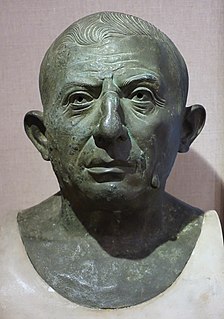Related Research Articles

This article concerns the period 49 BC – 40 BC.

The Second Triumvirate was a political alliance formed after the Roman dictator Julius Caesar's assassination, comprising Caesar's adopted son Octavian and the dictator's two most important supporters, Mark Antony and Marcus Aemilius Lepidus. The triumvirate for organizing the republic, as it was formally known, ruled the Roman Republic essentially as a military dictatorship, with each of the triumvirs assuming charge of an individual set of provinces. Unlike the earlier First Triumvirate, the Second was an official, legally established institution, whose overwhelming power in the Roman state was given full legal sanction and whose authority outranked that of all other magistrates, including the consuls.

Gnaeus Domitius Ahenobarbus was a general and politician of ancient Rome in the 1st century BC.

Sextus Pompeius Magnus Pius, also known in English as Sextus Pompey, was a Roman military leader who, throughout his life, upheld the cause of his father, Pompey the Great, against Julius Caesar and his supporters during the last civil wars of the Roman Republic.
Mucia Tertia was a Roman matrona who lived in the 1st century BC. She was the daughter of Quintus Mucius Scaevola, the pontifex maximus and consul in 95 BC.
The gens Scribonia was a plebeian family at ancient Rome. Members of this gens first appear in history at the time of the Second Punic War, but the first of the Scribonii to obtain the consulship was Gaius Scribonius Curio in 76 BC.

The gens Pompeia was a plebeian family at ancient Rome, first appearing in history during the second century BC, and frequently occupying the highest offices of the Roman state from then until imperial times. The first of the Pompeii to obtain the consulship was Quintus Pompeius in 141 BC, but by far the most illustrious of the gens was Gnaeus Pompeius, surnamed Magnus, a distinguished general under the dictator Sulla, who became a member of the First Triumvirate, together with Caesar and Crassus. After the death of Crassus, the rivalry between Caesar and Pompeius led to the Civil War, one of the defining events of the final years of the Roman Republic.

The gens Didia, or Deidia, as the name is spelled on coins, was a plebeian family at ancient Rome, which first appears in history during the final century of the Republic. According to Cicero, they were novi homines. Titus Didius obtained the consulship in 98 BC, a dignity shared by no other Didii until imperial times.
Gaius Furnius was tribune of the plebs in 50 BC, and a friend and correspondent of Cicero.
The gens Calvisia was an ancient Roman family, which first rose to prominence during the final decades of the Republic, and became influential in imperial times. The first of the gens to obtain the consulship was Gaius Calvisius Sabinus in 39 BC.
Marcus Titius was a Roman politician and commander at the end of the Roman Republic.

The gens Antistia, sometimes written Antestia on coins, was a plebeian family at ancient Rome. The first of the gens to achieve prominence was Sextus Antistius, tribune of the plebs in 422 BC.
Gaius Calvisius Sabinus was a consul of the Roman Republic in 39 BC under the Second Triumvirate. He and his consular colleague Lucius Marcius Censorinus had been the only two senators who tried to defend Julius Caesar when his assassins struck on 15 March 44 BC, and their consulship under the triumvirate is taken as a recognition of their loyalty. An inscription, described by Ronald Syme as "one of the most remarkable inscriptions ever set up in honour of a Roman senator," praises Calvisius for pietas, his sense of duty or devotion. As a military officer, Calvisius is notable for his long service and competence, though he was not without serious defeats.

The gens Caecilia was a plebeian family at ancient Rome. Members of this gens are mentioned in history as early as the fifth century BC, but the first of the Caecilii who obtained the consulship was Lucius Caecilius Metellus Denter, in 284 BC. The Caecilii Metelli were one of the most powerful families of the late Republic, from the decades before the First Punic War down to the time of Augustus.

The gens Pomponia was a plebeian family at ancient Rome. Its members appear throughout the history of the Roman Republic, and into imperial times. The first of the gens to achieve prominence was Marcus Pomponius, tribune of the plebs in 449 BC; the first who obtained the consulship was Manius Pomponius Matho in 233 BC.
Sextus Julius Caesar was a Roman statesman, and the first member of the Julii Caesares to hold the consulship, which he attained in 157 BC.
Sextus Julius Sex. f. Sex. n. Caesar was a cousin of the Roman general Gaius Julius Caesar, and served as one of his lieutenants during the Civil War. He was killed in a revolt of the soldiers while still a young man.

The gens Munatia was a plebeian family at Rome. Members of this gens are first mentioned during the second century BC, but they did not obtain any of the higher offices of the Roman state until imperial times.
The gens Roscia, probably the same as Ruscia, was a plebeian family at ancient Rome. Members of this gens are mentioned as early as the fifth century BC, but after this time they vanish into obscurity until the final century of the Republic. A number of Roscii rose to prominence in imperial times, with some attaining the consulship from the first to the third centuries.
The gens Carrinatia was a plebeian family at ancient Rome. Members of this gens rose to prominence during the final century of the Republic, attaining the consulship in 43 BC.